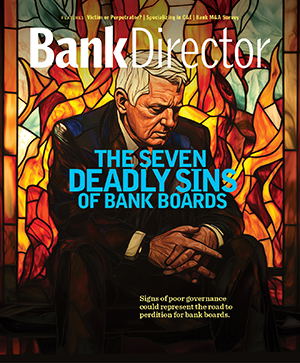
The Enduring Value of Common Sense
Bank Director’s sister magazine, Corporate Board Member, is focused on covering American business from a director’s perspective, and on providing guidance to the directors of public companies. We consistently draw on a number of expertsu00e2u20ac”attorneys from the top national firms, accountants for the nation’s largest companies, and nationally recognized specialists in corporate governance.
A few years ago, we formed an Academic Council made up of some very smart people, university professors whose waking hours are largely spent thinking about corporate governance. We bring that group of scholars together once or twice a year so that weu00e2u20ac”and youu00e2u20ac”can stay on the cutting edge of properly running a public company, be it a bank or pharmaceutical manufacturer.
It’s news to no one that being a director in an age of Sarbanes-Oxley is not without peril. This magazine, as well as Corporate Board Member, has had any number of articles of the “Do this, Don’t do that” variety. Yet given the academic heft of our Academic Council, it’s interesting that, at the end of the day, its members say it’s still all about common sense.
Here are some choice comments from our most recent gathering:
Jay W. Lorsch, professor, Harvard Business School, on the likely effect of Sarbanes-Oxley: “People will say that the legal position of the director is much more dangerous. Well it isn’t. That’s why I don’t buy into the Chicken Little syndrome. The sky is not falling, but many people want to believe that it is, and they tell everybody, and everybody begins to repeat it because it’s great for the professionals who advise boards. That’s one of the most dangerous unintended consequences, because the more people get scared and worried, the less likely they will be to join boards.”
Charles M. Elson, professor, Chair of Corporate Governance at The University of Delaware, on the currently popular idea of evaluating directors: “Evaluation is tough. It’s terrific in theory, but in practice it’s much more difficult. It’s very hard to evaluate a fellow director effectively, for many reasons. It’s a process that’s fraught with difficulty, and has the potential, unfortunately, of stifling dissent on the board, which sometimes can be a good thing. In fact, someone who becomes the dissenter might be an excellent director for the shareholders.”
Steven N. Kaplan, professor of entrepreneurship and finance, University of Chicago, on bucking the CEO: “If you cannot tell the CEO, ‘I think that’s a bad idea,’ and if you feel you can’t do that in a productive way, run away from the board, because you are not going to be effective, and you are not going to be happy in that environment.”
The truth is, when you factor in all the new requirements and exposures coming from Sarbanes-Oxley, the ever-more litigious environment, and the heightened public attention on the role of the director, it is still the duty of care that rules the day, and it is still common sense that defines care.
(Bank Director has on hand a limited number of “Emerging Trends in Corporate Governance,” the 2003 colloquium of the Academic Council of Corporate Board Member magazine. Send us your business card, and we’ll send it along.)

Join OUr Community
Bank Director’s annual Bank Services Membership Program combines Bank Director’s extensive online library of director training materials, conferences, our quarterly publication, and access to FinXTech Connect.
Become a Member
Our commitment to those leaders who believe a strong board makes a strong bank never wavers.

